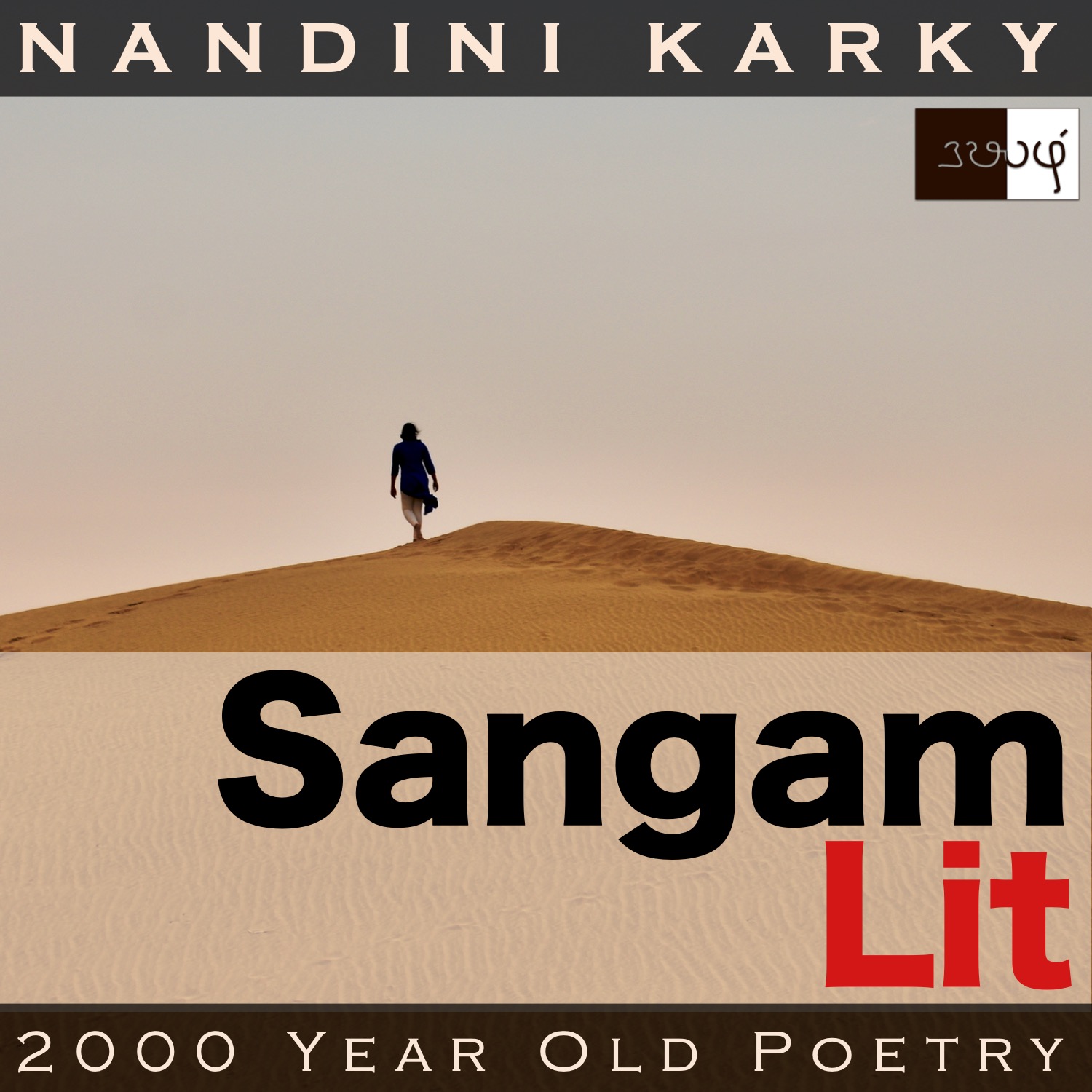Podcast: Play in new window | Download
Subscribe: Apple Podcasts | Spotify | Amazon Music | Android | iHeartRadio | TuneIn | RSS | More

In this episode, we relish how metaphors paint a vision of joy, as portrayed in Sangam Literary work, Natrinai 235, penned by an anonymous poet. The verse is set in the coastal landscape of ‘Neythal’ and speaks in the voice of the confidante to the lady, conveying the jubilant news of the man’s arrival to seek the lady’s hand in marriage.
உரவுத் திரை பொருத பிணர் படு தடவு முதல்,
அரவு வாள் வாய முள் இலைத் தாழை
பொன் நேர் தாதின் புன்னையொடு கமழும்
பல் பூங் கானல் பகற்குறி வந்து, நம்
மெய் கவின் சிதையப் பெயர்ந்தனனாயினும்,
குன்றின் தோன்றும் குவவு மணல் ஏறி,
கண்டனம் வருகம் சென்மோ-தோழி!-
தண் தார் அகலம் வண்டு இமிர்பு ஊத,
படு மணிக் கலி மாக் கடைஇ,
நெடு நீர்ச் சேர்ப்பன் வரூஉம் ஆறே.
With the words ‘உரவுத் திரை’, meaning ‘powerful waves’, that ancient coast welcomes us! ‘தடவு முதல்’ refers to the ‘curved trunk’ of a tree. Note how the word ‘முதல்’, which means ‘first’, ‘foundation’ or ‘capital’ in contemporary language, has been used to refer to a tree’s part. Perhaps, the connection is that the trunk is the base on which the rest of the tree rests. The tree in question, we learn is the ‘தாழை’ or ‘pandanus’ tree, also called as the ‘fragrant screwpine’. The screwpine is not the only tree to delight us on this shore for there is the ‘பொன் நேர் தாதின் புன்னை’ meaning ‘laurel tree with gold-like pollen’. The phrase ‘குவவு மணல்’ brings forth another familiar image from the shore, the sight of ‘heaped sand’. ‘தண் தார் அகலம்’ talks about a ‘chest adorned with a cool garland’. Curiously, the word ‘அகலம்’ has come to mean ‘width’ in current-day lingo. Body builders in physical training, obsessed with the ‘width’ of chests, would be amused to know this old meaning of the word. ‘படு மணிக் கலி மா’ conjures the sound and image of a ‘fierce horse with echoing bells’. The verse ends with ‘வரூஉம் ஆறே’ meaning ‘the path on which he arrives’. Let’s explore this path to know more!
The man and lady had been leading a love relationship and the man had been trysting with the lady by day. After he leaves, the lady suffers in anguish, pining for him. One day, she turns to her confidante and conveys her angst. Hearing this, the confidante replies, “Pounded upon by strong waves, the curved trunk of the ‘thazhai’ tree is wounded and rough to touch. This ‘thazhai’, with thorny leaves akin to the serrated edges of a saw, joins together with the ‘punnai’, which sheds a gold-like pollen, and together, send out a rich fragrance amidst the many flowers of this orchard. In this orchard, he had trysted with you by day and then went away, leaving your beauty to be ruined. Now, let us go climb on that heaped sand that looks like a mountain peak, and see. Come, my friend, let us see the path on which the lord of the mighty seas arrives, with a cool garland around his chest, swarming with honey-suckling bees, riding a proud horse adorned with resounding bells!” With these words, the confidante conveys to the lady that her troubles are over and that the man was on his way to seek the blessings of elders for their marriage.
Now, for the delicate intricacies! The first image that the confidante brings before our eyes is a ‘thazhai’ tree, adjacent to the sea. As the tree is this close to the sea, the powerful waves keep dashing against it and because of this, the tree’s trunk has turned rough. From the trunk, we move up to the leaves of the tree. The confidante compares the thorny edges of these ‘pandan’ leaves to the edges of a saw. After such a rich description of the tree, the confidante then talks about the golden pollen of the ‘punnai’ tree and mentions how both these trees together send out a unique fragrance in that orchard with many, many flowers. The confidante continues as if she talks about all this only to mention the trysting spot of the man and the lady, that very orchard. She accepts the lady’s angst saying indeed the man had left her to suffer after his daily trysts. Then, with a change of tone in her voice, she beckons the lady to accompany her to the mounds of sand on the shore. Why? Just so that they can now glimpse the man rushing towards their little hamlet on his horse, bells resounding, without any secrecy, to claim the hand of the lady!
Within the description of the two trees in the orchard, the confidante conceals the metaphor of how the waves of pining had kept attacking the lady and leaving her beauty to be ruined, akin to the rough surface of the ‘thazhai’ trunk. Then, when she mentions, the ‘punnai’ tree as shedding gold-like pollen, she is referring to the man’s arrival with gold and other precious gems to be offered to the lady’s parents, so as to claim their girl’s hand. The confidante foresees that the lady’s kith and kin will give their blessings and thus, the lady and the man will begin a blissful, marital life and spread the fragrance of joy in their little village by the shore.




Share your thoughts...